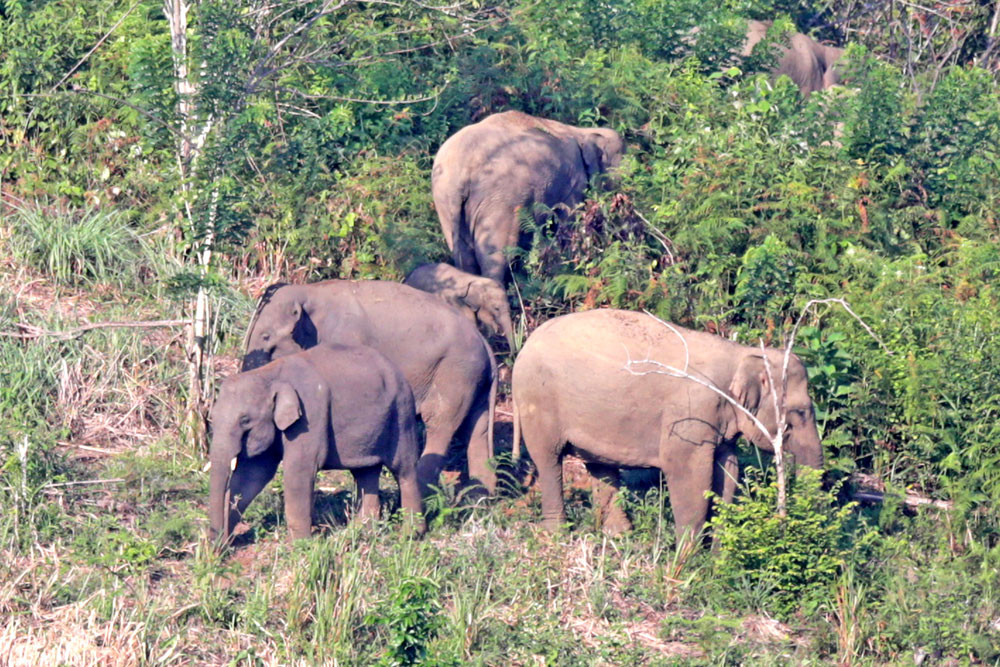Popular Reads
Top Results
Can't find what you're looking for?
View all search resultsPopular Reads
Top Results
Can't find what you're looking for?
View all search resultsInnovation needed to end human-elephant conflict in Sumatra, says WWF Indonesia
The Sumatran elephant population has fallen around 35 percent in the past two decades from about 2,652 individuals to 1,724.
Change text size
Gift Premium Articles
to Anyone
O
ver the past few years, the conflict between humans and elephants on the island of Sumatra has become inevitable as they both try to defend the land they claim as their own, making it urgent to find a way to keep the giant mammals away from humans.
World Wildlife Fund (WWF) Indonesia said massive land conversions across the island since the 1980s have turned forested areas, which are the natural habitat of the Sumatran elephant, into plantations and residential areas.
The elephants, that lost their homes then, at times entered the transformed areas seeking food. Humans, who were irritated by their presence, did everything they could to get rid of the animals from their properties.
Last year, two farmers died in two separate incidents after trying to drive away a herd of elephants from their plantations in Lampung. The first incident occurred in Talang Marno forest in July, when a herd attacked a 70-year-old man near his hut. The second one took place in August in Pemerihan forest, in which a 60-year-old woman was the victim.
But more elephants have died than humans, according to WWF Indonesia. At least three of the giant mammals were reportedly killed in Aceh, Jambi and Lampung last year in conflicts with humans. Seven were killed in 2017 and 13 in 2016.
“Residents try to get rid of the elephants in a very, very brutal way,” Chik Rini, a communication officer of WWF Indonesia, said on Friday. She added that some farmers and villagers even killed the critically endangered animals with poison or snares.
“This cruel behavior needs to be stopped immediately by [among other things] inventing effective and innovative tools to drive away elephants from plantations and villages to avoid people becoming victims,” Rini said.
WWF Indonesia, therefore, has initiated a competition to design these tools with prize money of Rp 10 million (US$705) for the winner, or a group of winners. The top three candidates will each get Rp 10 million as well as the opportunity to visit Aceh and live in an area inhabited by elephants to test their proposed tool.
Rini said entries should be submitted to WWF Indonesia on April 30 at the latest, through http://bit.ly/FormProposalPandaInnovation2019.
“Hopefully, this competition can help us to save the elephants as well as human beings.”
Sumatran elephants dwell in the lowland forests of Sumatra, Aceh, North Sumatra, Bengkulu, Jambi and Lampung, with most of them foraging in unprotected areas.
Their status has been listed as endangered to being critically endangered on the International Union for Conservation of Nature (IUCN) Red List in 2012 due to significant habitat degradation and poaching.
The human-wildlife conflict mitigation manager at WWF Indonesia, Dede Hendra Setiawan, said the Sumatran elephant population had fallen around 35 percent in the past two decades from about 2,652 individuals to 1,724.
The majority of the existing elephants, around 85 percent, live outside conservation areas, which increases the probability of conflict with humans.
“Because of elephants’ nature of exploring vast areas, humans need tools to secure their properties from the animals, but the tools should be safe for both humans and elephants,” Dede said.










